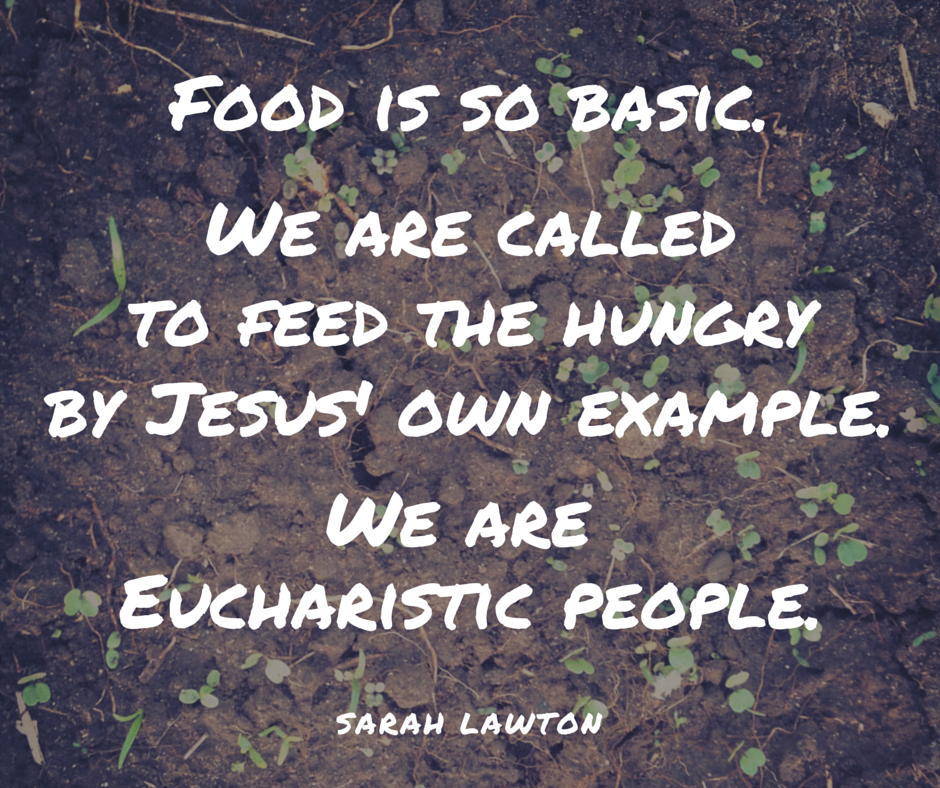Episcopalians To Consider Food Ministry Resolution

It’s number A091: Affirm Work for Food Ministries and Food Security. (The resolution is part of their full report to the church, which is worth reading in its entirety.) The resolution calls on the church to grow in awareness of the moral implications of our current food system and to advocate for a more sustainable and just food system. Since all of us eat every day, along with all the rest of humanity, nothing could be more relevant.
I asked Sarah Lawton, Chair of the Commission on Social Justice and Public Policy, to share with us the background for this resolution and the effects the Commission hopes to achieve.

What are the roots of this resolution for you?
For me personally, I am involved in the Fight for 15 movement, which seeks to raise minimum wages for low-wage workers, including fast-food and retail/grocery workers, and which has highlighted the low wages paid to workers throughout the food chain. My own congregation in San Francisco is located in a very mixed-income and gentrifying neighborhood where many families have food insecurity—our food pantry provides groceries to at least 200 families, rain or shine, week in and out—and we also have an increasing number of high-end restaurants and a big foodie culture just steps away from the church. There is this abundance of amazing food being served on the same blocks where families live who are struggling to feed their children, and who are relying on school lunch and breakfast programs, SNAP benefits, and charity to close the gaps. So my own perspective is very much an urban one—one at the far end of the food chain, as opposed to the producer/farmer end. But we tried to look the whole thing, from farm to table.
What about for the broader commission?
One of our challenges is that our commission charge is very broad: social justice and public policy. No way can we address all of the pressing social justice issues in one triennium! (My biggest regret in this triennium is that we did not take up the issue of racial disparities in policing, on which there is so much focus and action now since Ferguson, Staten Island, and Baltimore—but that movement arose just as we were wrapping up our work early in the fall of 2014.) One thing we have tried to do as a commission is address “gaps” in the Episcopal Church’s official policy statements; for example, we have a resolution this time on taxation. But this food resolution had another purpose, which was to try to connect the dots from the local to the global level, from congregational action to systemic change.
What kind of real-world impact could this resolution achieve?
One of the criticisms of General Convention’s social justice policy statements is that they supposedly don’t connect to congregational-level action. I actually disagree with this—many of us are doing work on the local level on many issues such as immigration policy, climate change, and gun violence, and we are grateful to have the support of and connection to the Church in doing so. And I also argue that the Church has an important moral voice to raise to government leaders on many issues and that we are especially effective when we work together with our brothers and sisters from other Christian and faith traditions to speak to the moral concerns.
One of the criticisms of General Convention’s social justice policy statements is that they supposedly don’t connect to congregational-level action. I actually disagree with this. Many of us are doing work at the local level on many issues… and we are grateful to have the support of and connection to the Church in doing so.
But hearing this concern, that our social justice policy statements are somehow removed from the day-to-day life of people in the pews, we decided to craft a resolution that starts where so many congregations already have active ministries. Most congregations, whether rural, suburban, or urban, have some kind of food ministry. Food is so basic. We are called over and over to feed the hungry, by the words in the Bible, and by Jesus’s own example. We are Eucharistic people. On a practical level, many people and congregations are already there, doing wonderful work in community gardens, food pantries, soup kitchens, and more.
Our question became, is there way to connect that work to policy and advocacy issues in the whole food chain? If people in our communities are food insecure, or don’t have access to nutritious food, can we do more than offer a weekly bag of groceries? Can we help the change the system? Can we become more connected to where our food comes from, both the land and the people who produce it, and to the environmental and human costs that are incurred by the system as it is currently run?
What will happen to this resolution at Convention? What about afterwards?
The resolution as currently presented may change at General Convention. It will go through committee and then to the two Houses, where it must be passed in the same form. We would welcome the thoughts of Episcopalians who are involved in food ministries, especially in person at the legislative hearing on this resolution, or at least in the form of letters and emails ahead of time. Whatever passes General Convention, we will have no way to mandate or force local congregations or dioceses to do this work—hence the emphasis on “affirm” and “support” and “encourage.”
What we tried to offer here is a way to look at our very local food ministries, wherever they are in the food chain, and to encourage us to see them more holistically and systemically, and to engage in a deeper level of justice ministry around them, through education, advocacy, and relationship-building. This same approach could be used for just about any justice issue, but we hope this can be a model for how to look at social justice work. We really hope more congregations dig into these food justice issues in the coming years.
Nurya again –
I am grateful to the entire Commission for their research, prayer, and action during this triennium to develop this resolution. Reading it and learning about the work of the Commission has been profoundly encouraging to me as someone engaged in food and farm ministries. So, it is already having the desired effect, albeit on a small scale (of one!).
I look forward to following this resolution through General Convention to see what the wider church does in response to it. If you want to track this resolution’s progress through General Convention, check out the General Convention legislative site. The next step for this resolution is consideration by the Environmental Stewardship and Care of Creation Legislative Committee. Unless the schedule changes or I am reading it wrong, they will meet for the first time on Monday evening, June 23rd.
What can you add or share in response to this resolution?





Member discussion